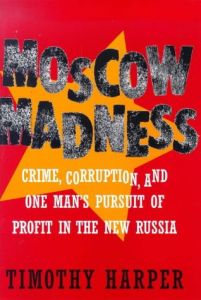Join getAbstract to access the summary!

Join getAbstract to access the summary!
Timothy Harper
Moscow Madness
Crime, Corruption, and One Man's Pursuit of Profit in the New Russia
McGraw-Hill, 1999
What's inside?
Business on the capitalist frontier.
Recommendation
Journalist Timothy Harper has written an absorbing, detailed business saga. This intimate account chronicles the wild and frustrating adventures of U.S. businessman Rick Grajirena, an import-export entrepreneur in Russia’s new free-market economy. "It was not difficult for Grajirena to find prospective partners and possible deals. Indeed, when it became known that he was an American looking to buy and sell in Russia, all sorts of characters - some seemingly reputable, many obviously not - came forward with one scheme after another." In the midst of this colorful cast of characters, Grajirena shines as one of the "good guys" as he jumps into and out of the beer biz and ends up in health foods. He runs into every form of Moscow madness, from the mafiya to some basic cultural divides, and manages to thrive as well as survive. getAbstract.com highly recommends this swashbuckling book. In fact, we can’t wait for the movie.
Summary
About the Author
Timothy Harper is a former Associated Press national writer and foreign correspondent. He is a member of the adjunct faculty at Columbia University’s Graduate School of Journalism, and contributing editor for Delta Sky magazine. He has written several books about doing business in Europe, serves as an editorial consultant and writing coach, and is a partner in an award-winning microbrewery, the Brooklyn Brewery.



















Comment on this summary